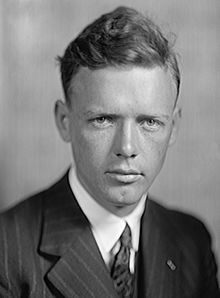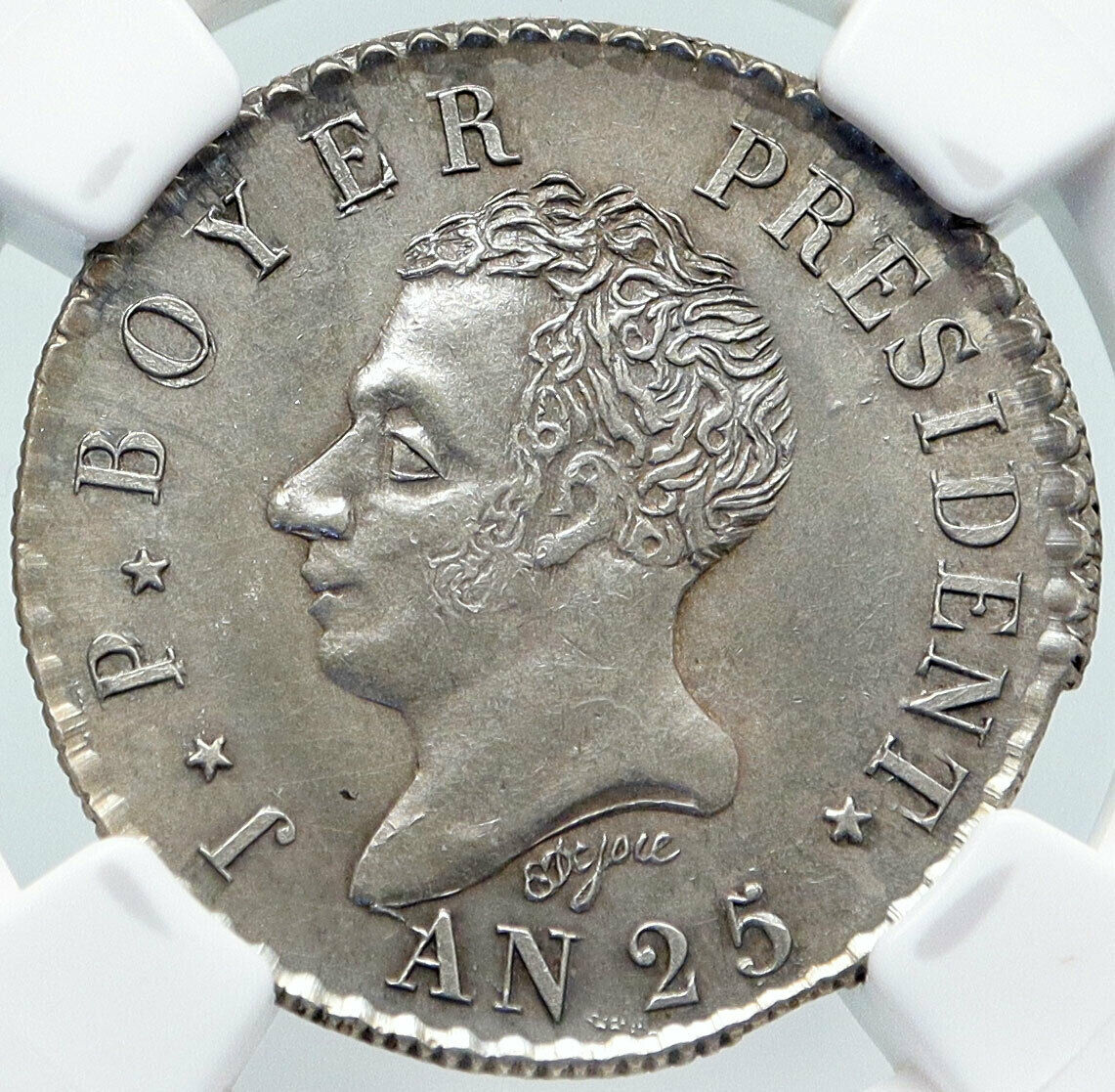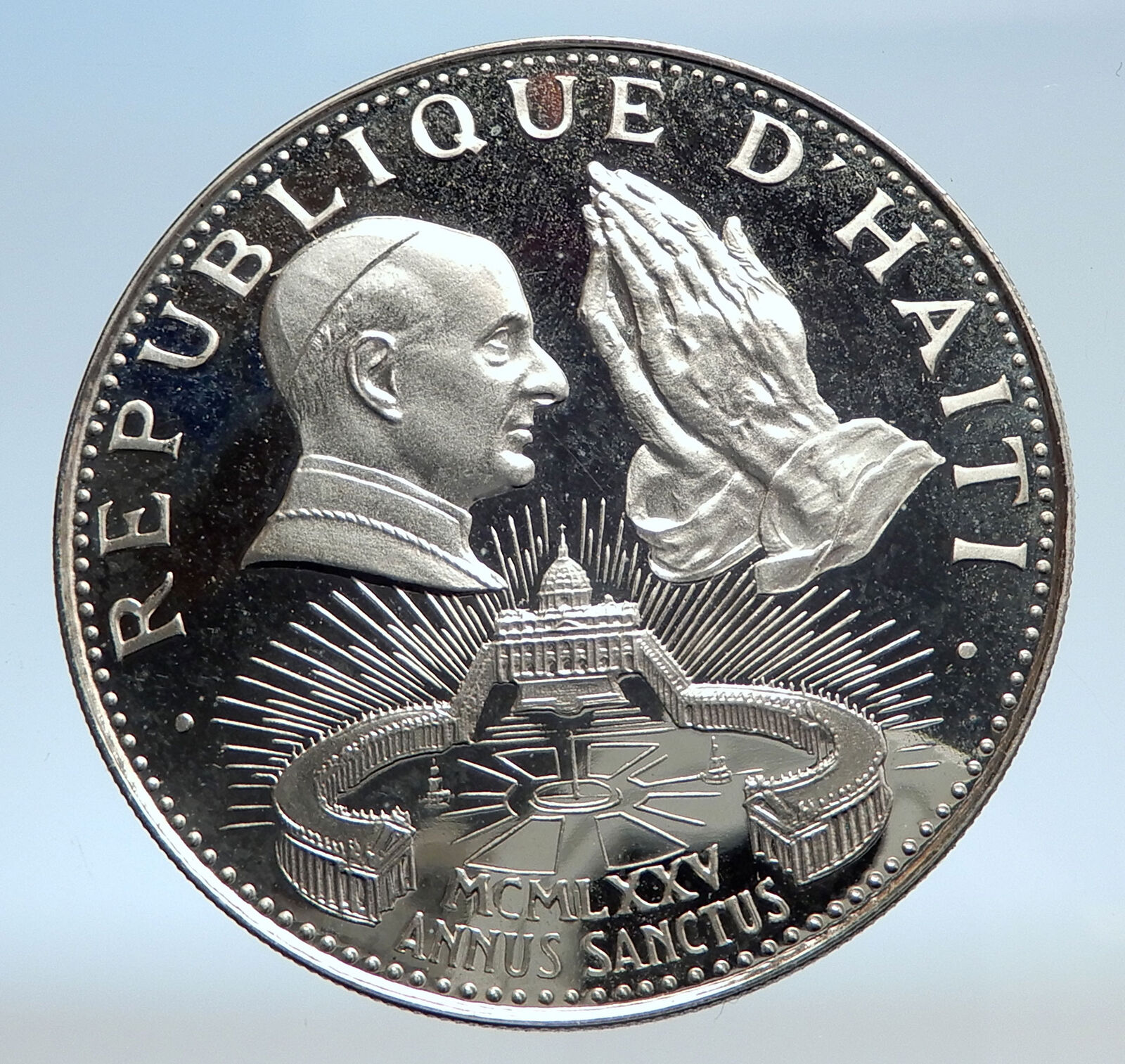|
Haiti
50th Anniversary of the transatlantic flight of Charles Lindbergh
1977 Proof Silver 100 Gourdes 41.5mm (43.00 grams) 0.925 Silver (1.2788 oz. ASW)
Reference: KM# 134
Certification: NGC PF 67 CAMEO 2839333-011
REPUBLIQUE D’HAÏTI CHARLES A. LINDBERGH 20.21 MAI 1927-1977 50 EME ANNIVERSAIRE, Biplane over ocean, Charles facing 1/4 left above.
LIBERTE EGALITE FRATERNITE 100 GOURDES 1977, Coat-of-Arms.
You are bidding on the exact item pictured, provided with a Certificate of Authenticity and Lifetime Guarantee of Authenticity.
 Charles Augustus Lindbergh (February 4, 1902 – August 26, 1974) was an American aviator, military officer, author, inventor, and activist. At age 25 in 1927, he went from obscurity as a U.S. Air Mail pilot to instantaneous world fame by winning the Orteig Prize for making a nonstop flight from New York to Paris. Lindbergh covered the 33 1⁄2-hour, 3,600-statute-mile (5,800 km) flight alone in a single-engine purpose-built Ryan monoplane, the Spirit of St. Louis. Although not the first non-stop transatlantic flight, this was the first solo transatlantic flight, the first transatlantic flight between two major city hubs, and the longest transatlantic flight by almost 2,000 miles, thus it is widely known as a turning point in the trajectory of aviation history and advancement. Charles Augustus Lindbergh (February 4, 1902 – August 26, 1974) was an American aviator, military officer, author, inventor, and activist. At age 25 in 1927, he went from obscurity as a U.S. Air Mail pilot to instantaneous world fame by winning the Orteig Prize for making a nonstop flight from New York to Paris. Lindbergh covered the 33 1⁄2-hour, 3,600-statute-mile (5,800 km) flight alone in a single-engine purpose-built Ryan monoplane, the Spirit of St. Louis. Although not the first non-stop transatlantic flight, this was the first solo transatlantic flight, the first transatlantic flight between two major city hubs, and the longest transatlantic flight by almost 2,000 miles, thus it is widely known as a turning point in the trajectory of aviation history and advancement.
 Lindbergh was an officer in the U.S. Army Air Corps Reserve, and he received the United States’ highest military decoration, the Medal of Honor, for his transatlantic flight. His achievement spurred interest in both commercial aviation and air mail, which revolutionized the aviation industry, and he devoted much time and effort to promoting such activity. Lindbergh’s historic flight and celebrity status also led to tragedy. In March 1932, his infant son, Charles Jr., was kidnapped and murdered in what the American media called the “Crime of the Century”. The case prompted the United States Congress to establish kidnapping as a federal crime once the kidnapper had crossed state lines with their victim. By late 1935, the hysteria surrounding the case had driven the Lindbergh family into exile in Europe, from which they returned in 1939. Lindbergh was an officer in the U.S. Army Air Corps Reserve, and he received the United States’ highest military decoration, the Medal of Honor, for his transatlantic flight. His achievement spurred interest in both commercial aviation and air mail, which revolutionized the aviation industry, and he devoted much time and effort to promoting such activity. Lindbergh’s historic flight and celebrity status also led to tragedy. In March 1932, his infant son, Charles Jr., was kidnapped and murdered in what the American media called the “Crime of the Century”. The case prompted the United States Congress to establish kidnapping as a federal crime once the kidnapper had crossed state lines with their victim. By late 1935, the hysteria surrounding the case had driven the Lindbergh family into exile in Europe, from which they returned in 1939.
Before the United States entered World War II, Lindbergh was an advocate of non-interventionism and a supporter of Nazi Germany. He opposed not only the intervention of the United States, but also the granting of aid to the United Kingdom. He supported the anti-war America First Committee and resigned his commission in the U.S. Army Air Forces in April 1941 after President Franklin Roosevelt publicly rebuked him for his views. In September 1941, Lindbergh gave an address stating that the British, the Jews and the Roosevelt administration were the “three most important groups” pressing for greater American involvement in the war. He also said capitalists, intellectuals, American Anglophiles, and communists were all agitating for war.
Lindbergh publicly supported the U.S. war effort after the Japanese attack on Pearl Harbor and the subsequent German declaration of war against the United States. He flew 50 missions in the Pacific Theater of World War II as a civilian consultant, but did not take up arms against Germany, and Roosevelt refused to reinstate his Air Corps colonel’s commission. In his later years, Lindbergh became a prolific author, international explorer, inventor, and environmentalist.
 Haiti, officially the Republic of Haiti (French: République d’Haïti; Haitian Creole: Repiblik Ayiti) and formerly called Hayti, is a country located on the island of Hispaniola, east of Cuba in the Greater Antilles archipelago of the Caribbean Sea. It occupies the western three-eighths of the island, which it shares with the Dominican Republic. Haiti is 27,750 square kilometres (10,714 sq mi) in size and has an estimated 10.8 million people, making it the most populous country in the Caribbean Community (CARICOM) and the second-most populous country in the Caribbean as a whole. The region was originally inhabited by the indigenous Taíno people. Spain landed on the island on 5 December 1492 during the first voyage of Christopher Columbus across the Atlantic. When Columbus initially landed in Haiti, he had thought he had found India or China. On Christmas Day 1492, Columbus’ flagship the Santa Maria ran aground north of what is now Limonade. As a consequence, Columbus ordered his men to salvage what they could from the ship, and he created the first European settlement in the Americas, naming it La Navidad after the day the ship was destroyed. Haiti, officially the Republic of Haiti (French: République d’Haïti; Haitian Creole: Repiblik Ayiti) and formerly called Hayti, is a country located on the island of Hispaniola, east of Cuba in the Greater Antilles archipelago of the Caribbean Sea. It occupies the western three-eighths of the island, which it shares with the Dominican Republic. Haiti is 27,750 square kilometres (10,714 sq mi) in size and has an estimated 10.8 million people, making it the most populous country in the Caribbean Community (CARICOM) and the second-most populous country in the Caribbean as a whole. The region was originally inhabited by the indigenous Taíno people. Spain landed on the island on 5 December 1492 during the first voyage of Christopher Columbus across the Atlantic. When Columbus initially landed in Haiti, he had thought he had found India or China. On Christmas Day 1492, Columbus’ flagship the Santa Maria ran aground north of what is now Limonade. As a consequence, Columbus ordered his men to salvage what they could from the ship, and he created the first European settlement in the Americas, naming it La Navidad after the day the ship was destroyed.
The island was named La Española and claimed by Spain, which ruled until the early 17th century. Competing claims and settlements by the French led to the western portion of the island being ceded to France, which named it Saint-Domingue. Sugarcane plantations, worked by slaves brought from Africa, were established by colonists.
In the midst of the French Revolution (1789-99), slaves and free people of color revolted in the Haitian Revolution (1791-1804), culminating in the abolition of slavery and the defeat of Napoleon Bonaparte’s army at the Battle of Vertières. Afterward the sovereign state of Haiti was established on 1 January 1804-the first independent nation of Latin America and the Caribbean, the second republic in the Americas, and the only nation in the world established as a result of a successful slave revolt. The rebellion that began in 1791 was led by a former slave and the first black general of the French Army, Toussaint Louverture, whose military genius and political acumen transformed an entire society of slaves into an independent country. Upon his death in a prison in France, he was succeeded by his lieutenant, Jean-Jacques Dessalines, who declared Haiti’s sovereignty and later became the first Emperor of Haiti, Jacques I. The Haitian Revolution lasted just over a dozen years; and apart from Alexandre Pétion, the first President of the Republic, all the first leaders of government were former slaves. The Citadelle Laferrière is the largest fortress in the Americas. Henri Christophe-former slave and first king of Haiti, Henri I-built it to withstand a possible foreign attack.
It is a founding member of the United Nations, Organization of American States (OAS), Association of Caribbean States, and the International Francophonie Organisation. In addition to CARICOM, it is a member of the International Monetary Fund, World Trade Organization, and the Community of Latin American and Caribbean States. It has the lowest Human Development Index in the Americas. Most recently, in February 2004, a coup d’état originating in the north of the country forced the resignation and exile of President Jean-Bertrand Aristide. A provisional government took control with security provided by the United Nations Stabilization Mission in Haiti (MINUSTAH).
|








 Charles Augustus Lindbergh (February 4, 1902 – August 26, 1974) was an American aviator, military officer, author, inventor, and activist. At age 25 in 1927, he went from obscurity as a U.S. Air Mail pilot to instantaneous world fame by winning the Orteig Prize for making a nonstop flight from New York to Paris. Lindbergh covered the 33 1⁄2-hour, 3,600-statute-mile (5,800 km) flight alone in a single-engine purpose-built Ryan monoplane, the Spirit of St. Louis. Although not the first non-stop transatlantic flight, this was the first solo transatlantic flight, the first transatlantic flight between two major city hubs, and the longest transatlantic flight by almost 2,000 miles, thus it is widely known as a turning point in the trajectory of aviation history and advancement.
Charles Augustus Lindbergh (February 4, 1902 – August 26, 1974) was an American aviator, military officer, author, inventor, and activist. At age 25 in 1927, he went from obscurity as a U.S. Air Mail pilot to instantaneous world fame by winning the Orteig Prize for making a nonstop flight from New York to Paris. Lindbergh covered the 33 1⁄2-hour, 3,600-statute-mile (5,800 km) flight alone in a single-engine purpose-built Ryan monoplane, the Spirit of St. Louis. Although not the first non-stop transatlantic flight, this was the first solo transatlantic flight, the first transatlantic flight between two major city hubs, and the longest transatlantic flight by almost 2,000 miles, thus it is widely known as a turning point in the trajectory of aviation history and advancement.  Lindbergh was an officer in the U.S. Army Air Corps Reserve, and he received the United States’ highest military decoration, the Medal of Honor, for his transatlantic flight. His achievement spurred interest in both commercial aviation and air mail, which revolutionized the aviation industry, and he devoted much time and effort to promoting such activity. Lindbergh’s historic flight and celebrity status also led to tragedy. In March 1932, his infant son, Charles Jr., was kidnapped and murdered in what the American media called the “Crime of the Century”. The case prompted the United States Congress to establish kidnapping as a federal crime once the kidnapper had crossed state lines with their victim. By late 1935, the hysteria surrounding the case had driven the Lindbergh family into exile in Europe, from which they returned in 1939.
Lindbergh was an officer in the U.S. Army Air Corps Reserve, and he received the United States’ highest military decoration, the Medal of Honor, for his transatlantic flight. His achievement spurred interest in both commercial aviation and air mail, which revolutionized the aviation industry, and he devoted much time and effort to promoting such activity. Lindbergh’s historic flight and celebrity status also led to tragedy. In March 1932, his infant son, Charles Jr., was kidnapped and murdered in what the American media called the “Crime of the Century”. The case prompted the United States Congress to establish kidnapping as a federal crime once the kidnapper had crossed state lines with their victim. By late 1935, the hysteria surrounding the case had driven the Lindbergh family into exile in Europe, from which they returned in 1939.  Haiti, officially the Republic of Haiti (French: République d’Haïti; Haitian Creole: Repiblik Ayiti) and formerly called Hayti, is a country located on the island of Hispaniola, east of Cuba in the Greater Antilles archipelago of the Caribbean Sea. It occupies the western three-eighths of the island, which it shares with the Dominican Republic. Haiti is 27,750 square kilometres (10,714 sq mi) in size and has an estimated 10.8 million people, making it the most populous country in the Caribbean Community (CARICOM) and the second-most populous country in the Caribbean as a whole. The region was originally inhabited by the indigenous Taíno people. Spain landed on the island on 5 December 1492 during the first voyage of Christopher Columbus across the Atlantic. When Columbus initially landed in Haiti, he had thought he had found India or China. On Christmas Day 1492, Columbus’ flagship the Santa Maria ran aground north of what is now Limonade. As a consequence, Columbus ordered his men to salvage what they could from the ship, and he created the first European settlement in the Americas, naming it La Navidad after the day the ship was destroyed.
Haiti, officially the Republic of Haiti (French: République d’Haïti; Haitian Creole: Repiblik Ayiti) and formerly called Hayti, is a country located on the island of Hispaniola, east of Cuba in the Greater Antilles archipelago of the Caribbean Sea. It occupies the western three-eighths of the island, which it shares with the Dominican Republic. Haiti is 27,750 square kilometres (10,714 sq mi) in size and has an estimated 10.8 million people, making it the most populous country in the Caribbean Community (CARICOM) and the second-most populous country in the Caribbean as a whole. The region was originally inhabited by the indigenous Taíno people. Spain landed on the island on 5 December 1492 during the first voyage of Christopher Columbus across the Atlantic. When Columbus initially landed in Haiti, he had thought he had found India or China. On Christmas Day 1492, Columbus’ flagship the Santa Maria ran aground north of what is now Limonade. As a consequence, Columbus ordered his men to salvage what they could from the ship, and he created the first European settlement in the Americas, naming it La Navidad after the day the ship was destroyed. 




